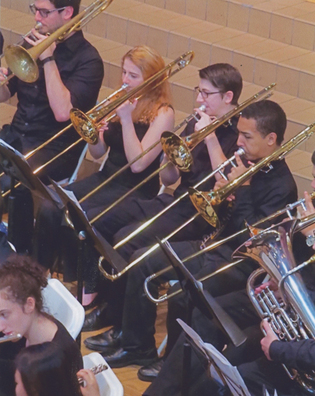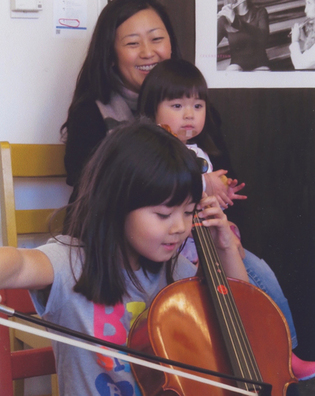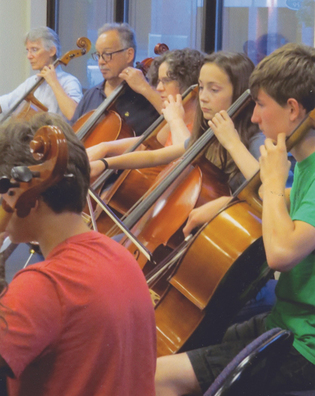 loading
loading
New HavenMusic in the neighborhoodNew Haven’s Neighborhood Music School has taught thousands to sing, dance, and play. Christopher Arnott has been covering the arts in Connecticut for over 30 years.  Grace FeldmanThe trombone section of the Neighborhood Music School’s high school band sounds off in a performance in Yale’s Battell Chapel. High school and middle school musicians from all over central Connecticut audition for NMS’s Greater New Haven Youth Ensembles. View full imageThe Neighborhood Music School is a music (and dance and theater) school in the Audubon Street area of New Haven, not far from Timothy Dwight College. But let’s think about that name another way. Is there such a thing as “neighborhood music”? What a concept: a harmonic blend of community devotion, cultural awareness, and love of the arts. The school has espoused such things for over a century. Its mission statement talks of a “Welcoming Space,” a “Community Presence,” “Diversity,” “Relationships,” and “Lifelong Learning.” Besides music and dance lessons for young and old, proficient and beginner, it runs “arts-infused” preschool programs for children as young as two years old. It offers a “Dancing with Parkinson’s” program for adults with movement disorders and their caregivers. It partners with other music programs in the area, including Yale’s Music in Schools Initiative. This past fall, it started an After School Arts Academy for students in grades three through five. On a recent weekday morning, members of “Vintage Voices,” a music and movement group for those over 60, gracefully glide around one of the large dance studios. On an upper floor, one of the early childhood music and movement classes is in session. Jennifer Sciglibaglio plays guitar and leads a group of toddlers in singing “Hello, friends!” (A separate toddler and preschool group meets five days a week.) The kids happily bang out rhythms on the tables. The studios and classrooms are bright and clean. The walls are colorfully painted. It’s a low-stress atmosphere, made even calmer by all the music that wafts around the building. A few hours later, after the public schools get out at 3:30, NMS enters its “heavy traffic period,” as marketing manager Lisa Rovello puts it. Audubon Street is jammed with drop-offs and pick-ups, while students swarm into the building for classes, individual lessons, and ensemble rehearsals. Music burbles up in the rooms, and the hallways fill with strollers, schoolbags, and parents using laptops.
 Grace FeldmanView full imageNMS was founded in 1911 as “a settlement house for new immigrants,” says its executive director, Dan Gurvich. The school now serves students from over 80 different Connecticut towns and cities. “We are one of the largest community arts schools in the country,” he adds. NMS “really enriches the quality of life in New Haven.” To do so, he says, it raises substantial funds every year to run tuition-free programs and to assist the students who couldn’t afford its high-quality private lessons otherwise: “Providing financial aid is very important to us. Of the 2,700 students we serve every year, over 500 receive financial aid.” NMS has built up a small endowment but operates mainly through tuition fees, donations, and grants. According to Mary Bloom, chair of the piano department, all of the school’s 60-odd pianos were donated by patrons. “Considering that most of our piano studios have side-by-side Steinways,” she says, “that says a lot about the community.” A youthful energy pervades the place, though Gurvich notes that fully a third of Neighborhood’s students are over the age of 18. Many students take part in ensemble classes, which range from jazz jams, to bluegrass and klezmer bands, to classical and early-music chamber groups. The school’s various ensembles present about 250 performances a year, dozens of them outside the school—as when NMS’s regional youth orchestra performs in Battell Chapel or at a retirement community, or its jazz ensembles take part in the New Haven Jazz Festival on the Green. (The headline act for the festival this year was Grammy-nominated pianist Christian Sands, an NMS alumnus.) Neighborhood’s regular bluegrass ensemble performs as the Elm City Ramblers every month at Anna Liffey’s Irish Pub in New Haven. For some students, public performances are a goal, but “this is not a conservatory,” says Rovello. “We are about helping people to learn and grow, wherever they’re at.”
 Grace FeldmanNMS has drawn both aspiring and accomplished musicians since it was founded more than a century ago; 2,700 students a year now participate in its wide-ranging classes, from toddlers on up. View full imageThe great majority of the school’s faculty members, some 140 in all, are artists and performers who trained in conservatories. About a tenth of the faculty studied at the Yale School of Music. Gurvich is a classical singer who studied with Phyllis Curtin and sings locally with the Yale Camerata and other groups. Stephen Dest, who helped create the NMS drama program (currently offering over a dozen classes) is a filmmaker whose work has been shown at the Cannes Film Festival. Anne Tofflemire, an accomplished cabaret performer and the wife of Yale School of Drama dean James Bundy ’95MFA, teaches a popular course on cabaret. Cello instructor Ravenna Michalsen ’01, ’04MA, runs Dignity Music, which stages free concerts at homeless shelters and soup kitchens. Michalsen, who grew up in Hamden, began attending classes at NMS when she was eight years old and studied there for ten years. “I didn’t come out of high school with friends,” she says; “I came out of Neighborhood Music School with friends.” New Haven, she notes, “is one of the few places in the country where you can make a living as a classical musician.” Michalsen adds: “At a place like Neighborhood Music School, you say, ‘Hey, I have this idea,’ and it happens. Everyone else believes in the projects you are doing. You’re playing everything from ‘Somewhere Over the Rainbow’ to ‘Hall of the Mountain King.’ You get to see people in the hallways, talk to your colleagues. I love the community aspect of it.”
The comment period has expired.
|
|